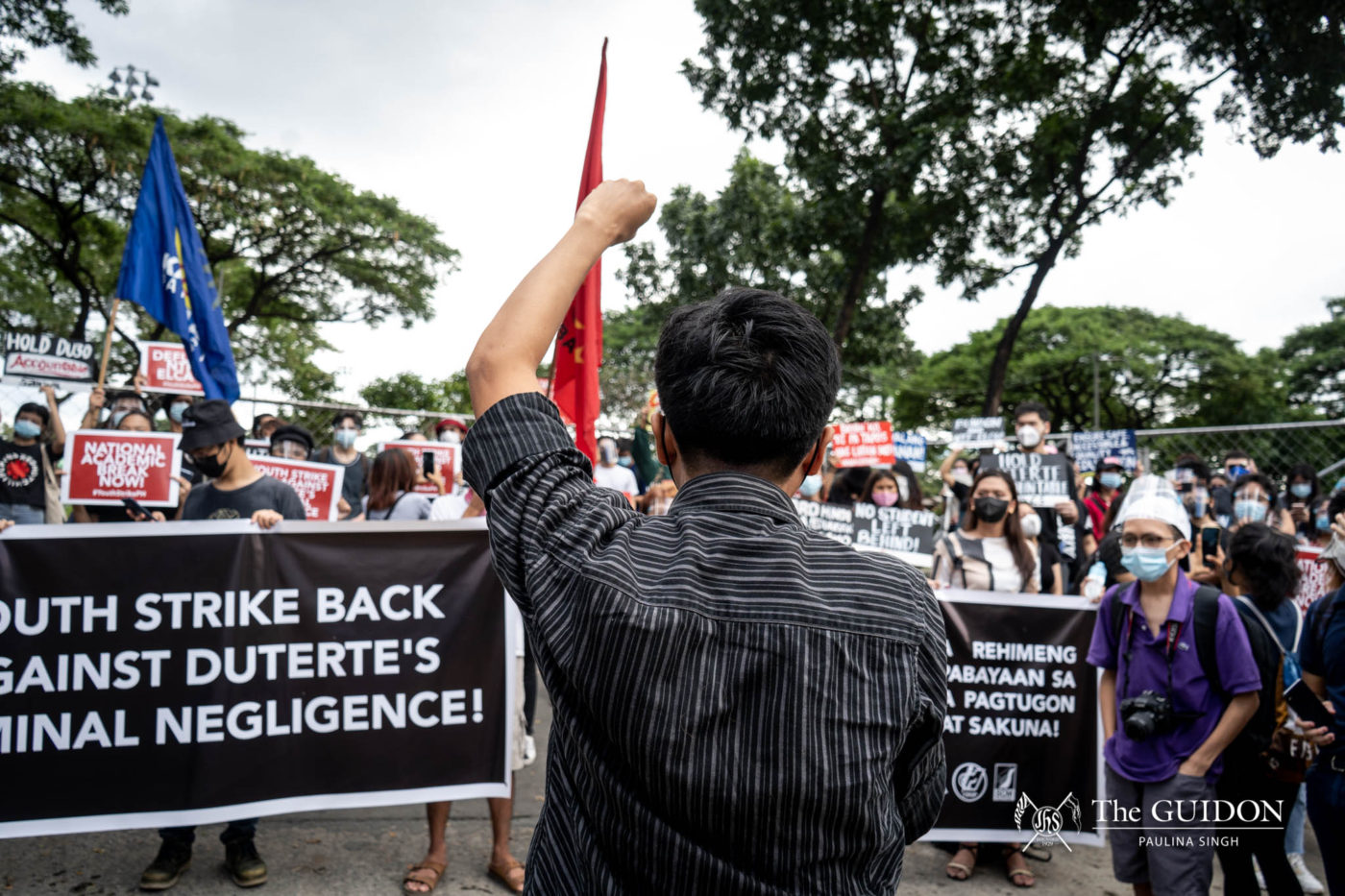IN A bid to protect Loyola Schools (LS) students from “socio-political harassment,” the Sanggunian School of Social Sciences (SOSS) is drafting the Socio-political Safeguarding Bill with the Council of Organizations of the Ateneo – Manila (COA-M) and the Sanggunian Commission on Socio-political Development (CSPD).
This development came at a time when recent red-tagging incidents occurred in the LS due to a mass student strike protesting the government’s response to the 2020 typhoons and the COVID-19 pandemic. In response to these incidents, the Bill will include a Socio-political Harassment Helpdesk and the appointment of the Sanggunian’s own legal counsel.
SOSS Representative TJ Alcantara added that the Bill is currently in its early drafting stages, but they expect to file the Bill in April and implement its initiatives by May. As of press time, the Bill is still undergoing consultations with the University administration, legal experts, and numerous student activist organizations.
Progress and processes
Alcantara first introduced the idea of the Bill to SOSS, the Sanggunian Central Assembly, the Ateneo Assembly, and the CSPD before the first semester of AY 2020-2021 began. He then officially announced the creation of the Bill in November following the government’s poor response to the recent calamities.
“I think that’s the main essence of this Bill—to politicize people, to encourage people to become more political and in a sense, to cultivate the true Atenean in us, to become men and women for others,” Ateneo Assembly Executive Director for Politicization Ryan Gorospe stated.
Sanggunian Commissioner on Socio-political Development Jannele Jimenez added that the Bill is currently in its early stages—its implementation with the University administration and student organizations is still being discussed.
To gather insights regarding the Bill, the technical working group consulted with Vice President for Social Development Rizalino Rivera, LS Legal Counsel Atty. Nina Sison-Arroyo, Associate Dean for Student Formation Leland Dela Cruz, Kabataan Partylist – Katipunan, One Big Fight for Human Rights and Democracy, and the Akbayan Youth – Loyola.
“Basically, what’s going on right now is a series of consultations about what the Ateneo can do and what kind of help activists would need. […] So, what the Bill contains isn’t necessarily set in stone yet, because we want the Bill to be grounded, like the realities on the ground,” Alcantara explained.
Primary initiatives
As part of the Bill’s initiatives, Gorospe said that the Socio-political Harassment Helpdesk has three major goals: Establish an efficient support system for student activists, respond to student complaints, and coordinate issues on students’ socio-political engagements.
Alcantara said that students who experience socio-political harassment may approach the Helpdesk, and then the Sanggunian can file a case report to the appropriate University office. Jimenez also mentioned that students can acquire permits for on-campus socio-political engagements and mobilizations through this Helpdesk.
Alcantara added that the Sanggunian is still deciding on how students can access the Helpdesk through online platforms. “We’re still deciding what [online platform] is easier. Do we make a page that is devoted to being a Helpdesk like Regcom, or do we just create multiple entry points?” he said.
Moreover, he explained that their legal counsel will advise the student on the best legal response against the harassment. He noted that the legal counsel will also review the Sanggunian’s socio-political statements and documents to ensure that these comply with the Sanggunian’s mandates and functions.
Meanwhile, Gorospe said that the BluePrint for Socio-political Engagement and the Bill is a “perfect combination” because they can assist each other in fostering greater socio-political engagement in the LS and protecting these student engagements from politically-motivated harassment.
Hurdles and complications
In the process of formulating the Bill, Alcantara said that the technical working group has encountered challenges with regard to the Sanggunian’s capacity to provide socio-political assistance. Similarly, Gorsope added that specifying the Bill’s definitions and provisions is challenging.
“Importante talaga malaman kung anong pwedeng sakop nitong Bill, anong pwede natin gawin with our resources, with our mandate, with our powers right now,” Alcantara said.
(It is important to know the feasible scope of the Bill, what we can do with our resources, and the powers and mandate we have as the Sanggunian.)
He also said that some Sanggunian members found it difficult to balance their academics alongside the drafting of the Bill, especially because recent red-tagging incidents pressured the members to finish the legislation more quickly. Gorospe also said that because they started the drafting process late, the Bill might be “shelved” when the new set of officers end the interim term.
To address these issues, Alcantara claimed that they will continue consulting with the University administration and youth organizations regarding these problems. “We really need consultation, research to supplement this. Ayaw rin naman namin na gumawa lang ng Bill na very vague, or gumawa lang because of pressure.”
High hopes
Despite these limitations, Gorospe stressed that the Bill is even more important with the upcoming 2022 National Elections, as political polarization might cause the number of socio-political harassment cases to rise.
Gorospe also added that he hopes the Bill will effectively protect students’ political rights and inspire them to be more politically participative. “People say that we’re apathetic, maybe in how they define it, but […] politics should be personal. Your politics […] must come from how you understand [it],” he said.
On the other hand, Alcantara hopes that this Bill will prompt the University administration to “lead the charge” on socio-political initiatives. Similarly, Jimenez said that this Bill will ideally help the Sanggunian mobilize and empower grassroots initiatives in the LS, as well as provide spaces for future socio-political initiatives to flourish.
“[Our] hope is that it kind of assuages the fear that’s kind of woven into not just the Atenean community but like the Philippines at large, […] that [it] doesn’t just get to help people in a technical way but […] also shift the sentiment and the feeling of the Ateneo community towards a more conscious politicization,” she said.







